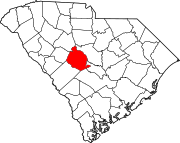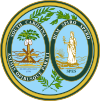Lexington County, South Carolina
Lexington County | |
|---|---|
U.S. county | |
 Lexington County Courthouse in October 2013 | |
| Motto(s): In God We Trust | |
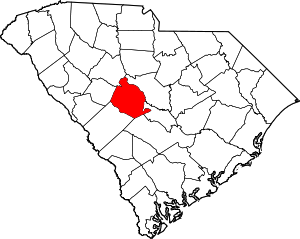 Location within the U.S. state of South Carolina | |
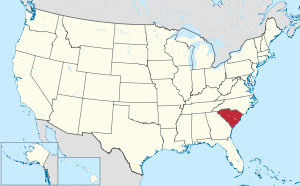 South Carolina's location within the U.S. | |
| Coordinates: 33°54′N 81°16′W / 33.9°N 81.27°W | |
| Country | |
| State | |
| Founded | 1785 |
| Named for | Battle of Lexington and Concord |
| Seat | Lexington |
| Largest town | Lexington |
| Area | |
| • Total | 758 sq mi (1,960 km2) |
| • Land | 699 sq mi (1,810 km2) |
| • Water | 59 sq mi (150 km2) 7.8%% |
| Population (2010) | |
| • Total | 262,391 |
| • Estimate (2020)[1] | 303,150 |
| • Density | 350/sq mi (130/km2) |
| Time zone | UTC−5 (Eastern) |
| • Summer (DST) | UTC−4 (EDT) |
| Congressional district | 2nd |
| Website | www |
Lexington County is a county located in the U.S. state of South Carolina. As of the 2010 census, the population was 262,391,[2] and the 2019 population estimate was 298,750.[1] Its county seat and largest town is Lexington.[3] The county was chartered in 1785[4] and was named in commemoration of Lexington, Massachusetts, the site of the Battle of Lexington in the American Revolutionary War.[5] Lexington County is the sixth-largest county in South Carolina by population and is part of the Columbia, SC Metropolitan Statistical Area.
Geography[]
According to the U.S. Census Bureau, the county has a total area of 758 square miles (1,960 km2), of which 699 square miles (1,810 km2) is land and 59 square miles (150 km2) (7.8%) is water.[6] The largest body of water is Lake Murray, while other waterways include the Broad River, the Saluda River and the Congaree River. Lexington County has urban, suburban, and rural landscapes. Much of the county's urbanization is in its eastern and northeastern areas.
Adjacent counties[]
- Richland County - east
- Orangeburg County - southeast
- Calhoun County - southeast
- Aiken County - southwest
- Saluda County - west
- Newberry County - northwest
Climate[]
Lexington County averages 48 inches of rain per year; the U.S. average is 37. The average snowfall is 2 inches; the U.S. average is 25 inches. The average number of days with any measurable precipitation is 104.
On average, there are 218 sunny days per year in Lexington County. The July high is around 92 degrees and the January low is 33. The comfort index, which is based on humidity during the warmest months, is a 29 out of 100, where higher is more comfortable. The U.S. average on the comfort index is 44.[7]
Demographics[]
| Historical population | |||
|---|---|---|---|
| Census | Pop. | %± | |
| 1810 | 6,641 | — | |
| 1820 | 8,083 | 21.7% | |
| 1830 | 9,065 | 12.1% | |
| 1840 | 12,111 | 33.6% | |
| 1850 | 12,930 | 6.8% | |
| 1860 | 15,579 | 20.5% | |
| 1870 | 12,988 | −16.6% | |
| 1880 | 18,564 | 42.9% | |
| 1890 | 22,181 | 19.5% | |
| 1900 | 27,264 | 22.9% | |
| 1910 | 32,040 | 17.5% | |
| 1920 | 35,676 | 11.3% | |
| 1930 | 36,494 | 2.3% | |
| 1940 | 35,994 | −1.4% | |
| 1950 | 44,279 | 23.0% | |
| 1960 | 60,726 | 37.1% | |
| 1970 | 89,012 | 46.6% | |
| 1980 | 140,353 | 57.7% | |
| 1990 | 167,611 | 19.4% | |
| 2000 | 216,014 | 28.9% | |
| 2010 | 262,391 | 21.5% | |
| 2020 (est.) | 303,150 | [8] | 15.5% |
| U.S. Decennial Census[9] 1790-1960[10] 1900-1990[11] 1990-2000[12] 2010-2019[2] | |||
2000 census[]
As of the census[13] of 2000, there were 216,014 people, 83,240 households, and 59,849 families living in the county. The population density was 309 people per square mile (119/km2). There were 90,978 housing units at an average density of 130 per square mile (50/km2). The racial makeup of the county was 84.18% White, 12.63% Black or African American, 0.34% Native American, 1.05% Asian, 0.04% Pacific Islander, 0.79% from other races, and 0.98% from two or more races. 1.92% of the population were Hispanic or Latino of any race.
There were 83,240 households, out of which 35.50% had children under the age of 18 living with them, 56.60% were married couples living together, 11.60% had a female householder with no husband present, and 28.10% were non-families. 22.50% of all households were made up of individuals, and 6.90% had someone living alone who was 65 years of age or older. The average household size was 2.56 and the average family size was 3.01.
In the county, the population was spread out, with 26.10% under the age of 18, 8.30% from 18 to 24, 31.60% from 25 to 44, 23.80% from 45 to 64, and 10.20% who were 65 years of age or older. The median age was 36 years. For every 100 females, there were 94.50 males. For every 100 females age 18 and over, there were 91.30 males.
The median income for a household in the county was $44,659, and the median income for a family was $52,637. Males had a median income of $36,435 versus $26,387 for females. The per capita income for the county was $21,063. About 6.40% of families and 9.00% of the population were below the poverty line, including 11.10% of those under age 18 and 9.30% of those age 65 or over.
2010 census[]
As of the 2010 United States Census, there were 262,391 people, 102,733 households, and 70,952 families living in the county.[14] The population density was 375.4 inhabitants per square mile (144.9/km2). There were 113,957 housing units at an average density of 163.0 per square mile (62.9/km2).[15] The racial makeup of the county was 79.3% white, 14.3% black or African American, 1.4% Asian, 0.4% American Indian, 2.7% from other races, and 1.9% from two or more races. Those of Hispanic or Latino origin made up 5.5% of the population.[14] In terms of ancestry, 17.2% were German, 14.0% were American, 12.5% were English, and 11.8% were Irish.[16]
Of the 102,733 households, 34.5% had children under the age of 18 living with them, 51.4% were married couples living together, 13.0% had a female householder with no husband present, 30.9% were non-families, and 24.9% of all households were made up of individuals. The average household size was 2.53 and the average family size was 3.01. The median age was 37.9 years.[14]
The median income for a household in the county was $52,205 and the median income for a family was $64,630. Males had a median income of $44,270 versus $34,977 for females. The per capita income for the county was $26,393. About 8.5% of families and 11.1% of the population were below the poverty line, including 15.7% of those under age 18 and 8.4% of those age 65 or over.[17]
Communities[]

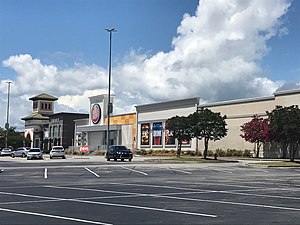

| Type | Name | Pop. (2019 est.) | Notes |
|---|---|---|---|
| Town | Lexington | 22,157 | County Seat |
| City | West Columbia | 17,998 | |
| City | Cayce | 14,009 | Partly in Richland County |
| City | Columbia | [a] | Mostly in Richland County |
| Town | Irmo | 12,483 | Partly in Richland County |
| Town | Batesburg-Leesville | 5,415 | Partly in Saluda County |
| Town | Springdale | 2,636 | |
| Town | South Congaree | 2,306 | |
| Town | Pine Ridge | 2,064 | |
| Town | Gaston | 1,645 | |
| Town | Chapin | 1,445 | |
| Town | Swansea | 827 | |
| Town | Pelion | 674 | |
| Town | Gilbert | 565 | |
| Town | Summit | 402 | |
| Town | Granby | 0 | Former town |
| Name | Pop (2010) |
|---|---|
| Seven Oaks | 15,755 |
| Oak Grove | 10,291 |
| Red Bank | 8,811 |
| Name | Population |
|---|---|
| Harbison | 5,204 |
Education[]
| Public school district name | Enrollment | Employees | Schools |
|---|---|---|---|
| Lexington School District One[21] | 27,300 | 3,900 | 31 |
| Lexington School District Two[22] | 8,947 | 900 | 12 |
| Lexington School District Three[23] | 2,000 | 350 | 4 |
| Lexington School District Four | 3,350 | 300 | 7 |
| Lexington & Richland County School District Five[b] | 16,680 | 1,500 | 21 |
| Colleges | Enrollment | Campuses | |
| Midlands Technical College[c] | 15,000[24] | 3 | |
| Public libraries | Visitors (counted once) | Branches | |
| Lexington County Public Library System | 160,336[24] | 10 | |
Transportation[]
Public Transportation[]

Public transportation in Lexington County is provided by the COMET, or officially the Central Midlands Regional Transit Authority (CMRTA). The bus system is the main public transit system for the greater Columbia area. In Lexington County, the bus system runs in the areas of West Columbia, Cayce, Irmo, Springdale, Seven Oaks, and Harbison. Additionally, COMET offers Dial-a-ride transit (DART), which provides personalized service passengers with disabilities.[25]
Columbia Metropolitan Airport[]

The Columbia Metropolitan Airport serves as the main airport system for the greater Columbia area. In 2018, the airport served 1,197,603 passengers with 12,324 flight. Additionally, the airport is also the regional hub for UPS Airlines, transporting 136.7 million pounds of freight/mail in 2018.[26] The airport was named Lexington County Airport, and during World War II, trained pilots for B-25 Mitchell crews.
Interstates[]
 I-26 Interstate 26 travels from northwest to southeast and connects the Columbia area to the other two major population centers of South Carolina: the Greenville-Spartanburg area in the northwestern part of the state and North Charleston – Charleston area in the southeastern part of the state.
I-26 Interstate 26 travels from northwest to southeast and connects the Columbia area to the other two major population centers of South Carolina: the Greenville-Spartanburg area in the northwestern part of the state and North Charleston – Charleston area in the southeastern part of the state. I-20 Interstate 20 travels from west to east and connects Columbia to Atlanta and Augusta in the west and Florence in the east. It serves the nearby towns and suburbs of Pelion, Lexington, West Columbia, Sandhill, Pontiac, and Elgin. Interstate 20 is also used by travelers heading to Myrtle Beach, although the interstate's eastern terminus is in Florence.
I-20 Interstate 20 travels from west to east and connects Columbia to Atlanta and Augusta in the west and Florence in the east. It serves the nearby towns and suburbs of Pelion, Lexington, West Columbia, Sandhill, Pontiac, and Elgin. Interstate 20 is also used by travelers heading to Myrtle Beach, although the interstate's eastern terminus is in Florence. I-77 Interstate 77 begins in Lexington county and ends in Cleveland, Ohio and is frequently used by travelers on the east coast heading to or from Florida.
I-77 Interstate 77 begins in Lexington county and ends in Cleveland, Ohio and is frequently used by travelers on the east coast heading to or from Florida.
Tourism and Attractions[]
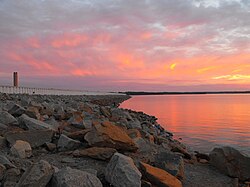
- Lake Murray
- Riverbanks Zoo[d]
- Riverbanks Botanical Garden
- Riverbanks Waterfall Junction and waterpark
- Lexington County Museum
- Lake Murray Dam
- Lexington County Baseball Stadium
- Cayce-West Columbia Riverwalk
- Fourteen-mile Creek Trail
- Columbiana Centre
Top Employers[]
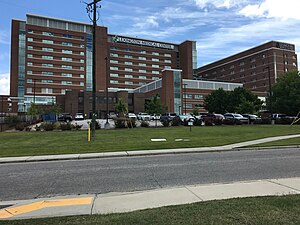
| Rank | Employer | Employees |
|---|---|---|
| 1 | Lexington Medical Center | 6,450 |
| 2 | Lexington School District 1 | 3,550 |
| 3 | Amazon | 2,825 |
| 4 | Michelin | 2,425 |
| 5 | Lexington School District Five | 2,354 |
| 6 | State government | 2,327 |
| 7 | Wal-Mart | 2,013 |
| 8 | SCANA | 1,790 |
| 9 | County of Lexington | 1,741 |
| 10 | Lexington School District 2 | 1,267 |
Referendums and elections[]
On November 4, 2014, Lexington County residents voted against a proposed sales tax increase. The money generated from this tax would have mostly been used to improve traffic conditions upon roadways.[27] Likewise on November 4, 2014, residents voted to repeal a ban on alcohol sales on Sundays within the county.[28]
Politics[]
Lexington County was one of the first areas of South Carolina to turn Republican. The last official Democratic candidate to carry the county at a presidential level was Franklin D. Roosevelt in 1944. It supported splinter Dixiecrat candidates in 1948 and 1956.
In the 2020 Presidential election, Lexington County voted 64.2% in favor of Republican Donald Trump and 34.2% in favor of Democrat Joe Biden[29] with 72.6% of the eligible electorate voting.[30]
The county is no less Republican at the state level. It has supported the Republican candidate for governor in every election since 1982 when Richard Riley carried every county in the state.[32] As late as 2006, Tommy Moore did manage 44 percent of the vote.[33] The last Democratic senatorial nominee to manage even 30 percent of the county's vote was Inez Tenenbaum in 2004, and no Democrat has carried the county since Ernest "Fritz" Hollings did so in 1980. In 1986, it was the only county in the state to support Hollings' GOP opponent Henry McMaster.[34]
Notable people[]
Floyd Spence Lexington County resident & Congressman for 30 years.
See also[]
- Birch County, South Carolina, a proposed county that would include existing portions of Lexington County
- National Register of Historic Places listings in Lexington County, South Carolina
Notes[]
References[]
- ^ Jump up to: a b "QuickFacts. Lexington County, South Carolina". Census.gov. Retrieved June 26, 2018.
- ^ Jump up to: a b "State & County QuickFacts". United States Census Bureau. Archived from the original on June 6, 2011. Retrieved March 18, 2015.
- ^ "Find a County". National Association of Counties. Archived from the original on May 31, 2011. Retrieved 2011-06-07.
- ^ "South Carolina: Individual County Chronologies". South Carolina Atlas of Historical County Boundaries. The Newberry Library. 2009. Archived from the original on January 3, 2017. Retrieved March 21, 2015.
- ^ Barefoot, Daniel W. (1999). Touring South Carolina's Revolutionary War Sites. John F. Blair, Publisher. p. 293. ISBN 9780895871824.
- ^ "2010 Census Gazetteer Files". United States Census Bureau. August 22, 2012. Retrieved March 18, 2015.
- ^ Climate in Lexington County, South Carolina. Bestplaces.net. Retrieved on 2013-07-24.
- ^ "Population and Housing Unit Estimates". Retrieved March 26, 2020.
- ^ "U.S. Decennial Census". United States Census Bureau. Retrieved March 18, 2015.
- ^ "Historical Census Browser". University of Virginia Library. Retrieved March 18, 2015.
- ^ Forstall, Richard L., ed. (March 27, 1995). "Population of Counties by Decennial Census: 1900 to 1990". United States Census Bureau. Retrieved March 18, 2015.
- ^ "Census 2000 PHC-T-4. Ranking Tables for Counties: 1990 and 2000" (PDF). United States Census Bureau. April 2, 2001. Retrieved March 18, 2015.
- ^ "U.S. Census website". United States Census Bureau. Retrieved 2011-05-14.
- ^ Jump up to: a b c "DP-1 Profile of General Population and Housing Characteristics: 2010 Demographic Profile Data". United States Census Bureau. Archived from the original on 2020-02-13. Retrieved 2016-03-11.
- ^ "Population, Housing Units, Area, and Density: 2010 - County". United States Census Bureau. Archived from the original on 2020-02-13. Retrieved 2016-03-11.
- ^ "DP02 SELECTED SOCIAL CHARACTERISTICS IN THE UNITED STATES – 2006-2010 American Community Survey 5-Year Estimates". United States Census Bureau. Archived from the original on 2020-02-13. Retrieved 2016-03-11.
- ^ "DP03 SELECTED ECONOMIC CHARACTERISTICS – 2006-2010 American Community Survey 5-Year Estimates". United States Census Bureau. Archived from the original on 2020-02-13. Retrieved 2016-03-11.
- ^ Jump up to: a b "U.S. Census Bureau Quick Facts". U.S. Census. July 2019. Retrieved 18 June 2020.
- ^ "Census Tract 211.11, Lexington County, South Carolina". U.S. Boundary. 2010. Retrieved 26 June 2020.
- ^ "Census Tract 211.12, Lexington County, South Carolina". U.S. Boundary. 2010. Retrieved 26 June 2020.
- ^ "About Lexington School District One". Lexington County School District One. n.d. Retrieved 24 June 2020.
- ^ "SC Report Cards". South Carolina Department of Education. n.d. Retrieved 24 June 2020.
- ^ "About Us: Lexington Three". Lexington School District Three. n.d. Retrieved 24 June 2020.
- ^ Jump up to: a b c "Comprehensive Annual Financial Report" (PDF). Lexington County Government. 2018. Retrieved 24 June 2020.
- ^ "The Comet Tracker". The Central Midlands Transit Authority. n.d. Retrieved 25 June 2020.
- ^ FAA Airport Form 5010 for CAE PDF, effective 2007-12-20
- ^ "Lexington County Voters Reject Penny Tax". Wltx.com. Retrieved 2 January 2018.
- ^ "Lexington County, Cayce voters repeal Sunday alcohol sales ban". Coladaily.com. 4 November 2014. Retrieved 2 January 2018.
- ^ "South Carolina Election Results". New York Times. 7 November 2020. Retrieved 27 November 2020.
- ^ "2020 Statewide General Election". SC Votes. 7 November 2020. Retrieved 27 November 2020.
- ^ Leip, David. "Dave Leip's Atlas of U.S. Presidential Elections". Uselectionatlas.org. Retrieved 2 January 2018.
- ^ Dave Leip's U.S. Election Atlas; 1982 Gubernatorial General Election Results – South Carolina
- ^ Dave Leip's U.S. Election Atlas; 2006 Gubernatorial General Election Results – South Carolina
- ^ Dave Leip's U.S. Election Atlas; 1986 Senatorial General Election Results – South Carolina
External links[]
- . The American Cyclopædia. 1879.
- South Carolina counties
- Lexington County, South Carolina
- 1785 establishments in South Carolina
- Populated places established in 1785
- Columbia metropolitan area (South Carolina)


